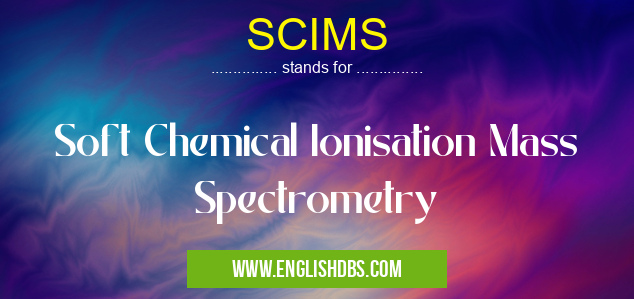What does SCIMS mean in CHEMISTRY
SCIMS stands for Soft Chemical Ionisation Mass Spectrometry. It is an analytical technique used to identify and characterize chemical compounds. SCIMS is a type of mass spectrometry that uses soft ionization methods to generate ions from the sample, which are then analyzed by a mass spectrometer.

SCIMS meaning in Chemistry in Academic & Science
SCIMS mostly used in an acronym Chemistry in Category Academic & Science that means Soft Chemical Ionisation Mass Spectrometry
Shorthand: SCIMS,
Full Form: Soft Chemical Ionisation Mass Spectrometry
For more information of "Soft Chemical Ionisation Mass Spectrometry", see the section below.
Principle of SCIMS
SCIMS utilizes chemical ionization (CI) techniques to generate ions from the sample. In CI, a reagent gas (such as methane or isobutane) is ionized by an electron beam or other ionization source. The ionized reagent gas then reacts with the sample molecules, transferring protons or other ions to form charged species. These charged species are then detected by the mass spectrometer.
Applications of SCIMS
SCIMS has a wide range of applications, including:
- Identification of organic compounds: SCIMS can be used to identify and characterize organic compounds, including those that are difficult to analyze by other methods.
- Analysis of complex mixtures: SCIMS can be used to analyze complex mixtures of compounds, such as those found in environmental samples or biological samples.
- Structural elucidation: SCIMS can provide information about the structure of organic compounds, including their molecular weight, elemental composition, and functional groups.
- Quantitative analysis: SCIMS can be used for quantitative analysis of certain compounds, such as drugs or pesticides.
Advantages of SCIMS
- Soft ionization: SCIMS uses soft ionization methods that minimize fragmentation, resulting in the formation of intact ions.
- High sensitivity: SCIMS is a highly sensitive technique that can detect trace levels of compounds.
- Versatility: SCIMS can be used to analyze a wide range of compounds, including polar and nonpolar compounds.
Essential Questions and Answers on Soft Chemical Ionisation Mass Spectrometry in "SCIENCE»CHEMISTRY"
What is Soft Chemical Ionisation Mass Spectrometry (SCIMS)?
SCIMS is a mass spectrometry technique that uses a soft ionisation method to generate ions from analyte molecules. It is a gentle ionisation method that minimises fragmentation and preserves the molecular integrity of the analyte.
How does SCIMS work?
SCIMS utilises a chemical ionisation (CI) source, where reagent gas molecules (e.g., methane, isobutane) are ionised by electron impact. The resulting reagent ions then react with analyte molecules via proton transfer, charge exchange, or adduct formation, producing analyte ions.
What are the advantages of SCIMS?
SCIMS offers several advantages:
- Soft ionisation: Preserves molecular integrity and reduces fragmentation.
- High sensitivity: Provides enhanced detection limits for certain analytes.
- Versatility: Can analyse a wide range of compounds, including polar and non-polar molecules.
- Compatibility: Can be coupled with various separation techniques (e.g., GC, LC) for comprehensive analysis.
What are the applications of SCIMS?
SCIMS finds applications in various fields, including:
- Environmental analysis: Identifying and quantifying organic pollutants in air, water, and soil.
- Food safety: Detecting pesticide residues, contaminants, and toxins in food products.
- Pharmaceutical analysis: Characterising drug metabolites, impurities, and degradation products.
- Forensic science: Identifying illicit substances, explosives, and other forensic materials.
Final Words: SCIMS is a powerful analytical technique that is used to identify and characterize chemical compounds. SCIMS offers several advantages, including soft ionization, high sensitivity, and versatility. It is widely used in various fields, including chemistry, biochemistry, and environmental science.
